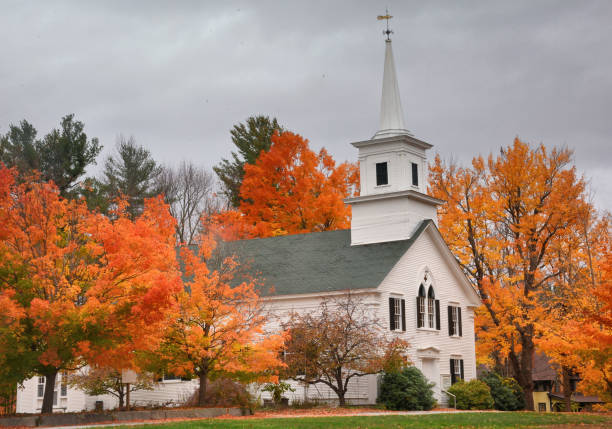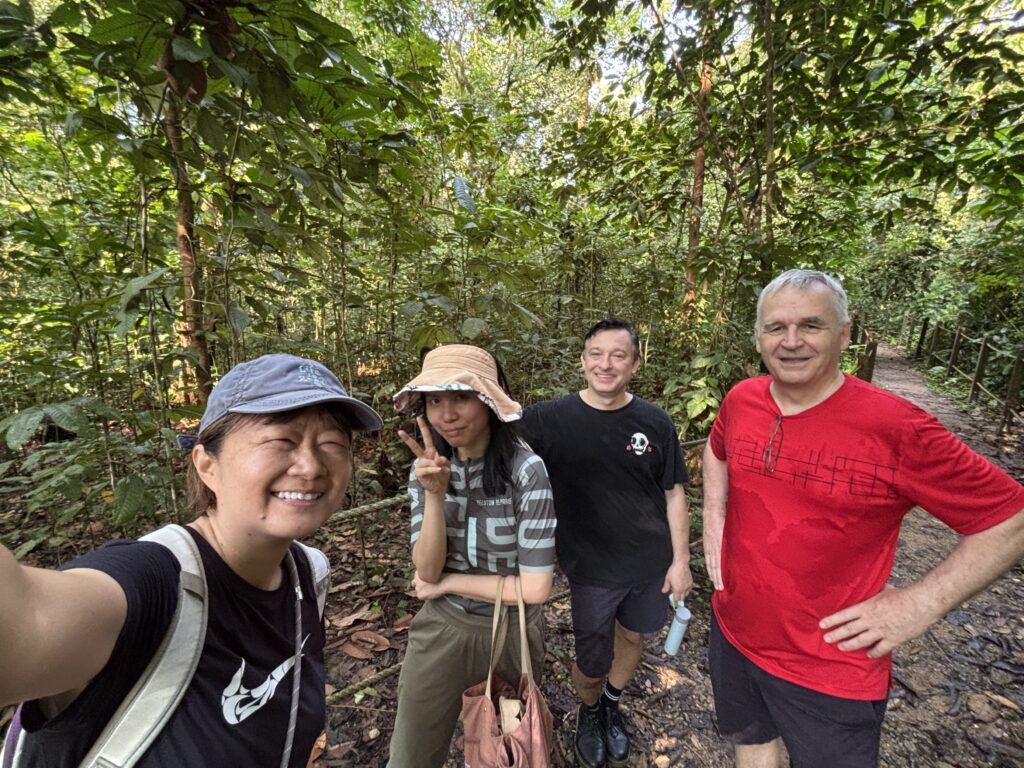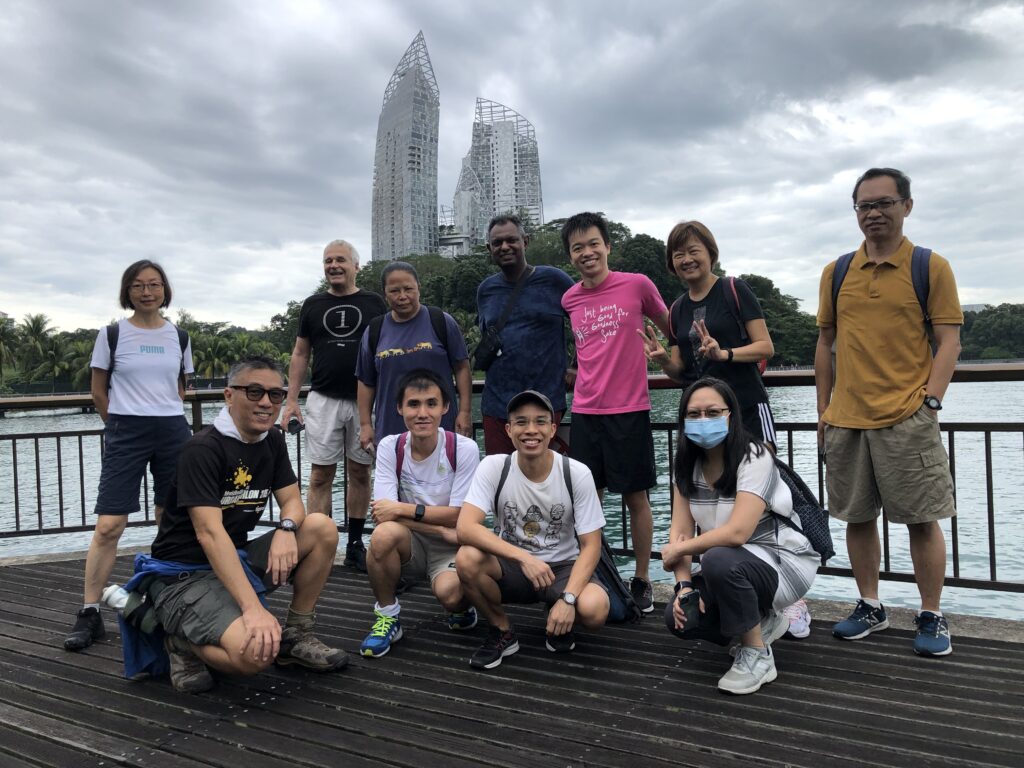
Over the long Easter weekend, Christians worldwide commemorated the death and resurrection of Jesus Christ. On Easter, the Humanist Society (Singapore) also occasionally carries out interviews with a handful of Christians have been regularly attending our events for years. They are independent-minded, well-read, and supportive of many Humanist causes. Their perspectives are valuable as a bridge between Christian and non-religious communities.
Previous interviews are with John Hui (2017) and Mathia Lee (2020) and a summary of both interviews are found at the bottom of this post.
This year, we feature Angela Ow (photo below, first from left), who has been participating in Humanist Society (‘HumanistSG’) events for the past seven years. Her favourite events were the hikes at nature parks, as well as our Humanist Cafe series.

Q: What is your religious faith and what religious services do you attend regularly?
Angela: I identify as a Catholic Christian. My father was an agnostic atheist and my mother was Roman Catholic, so I grew up with a mix but went through Catholic formation from a young age. These days, I go to a non-denominational community church, but I still attend Catholic Masses on many occasions.
Q: When did you start attending Humanist Society events? And what attracted you to our events?
Angela: I can’t remember exactly, but I think it was sometime around late 2018? That’s when I started going to the monthly Humanist Cafés and joined the hikes whenever they were held (I love hiking!). Back then, the Cafés didn’t have set themes, so the conversations just flowed naturally. I remember some interesting discussions on history, astronomy, and science. There was even one on quantum physics that totally went over my head – haha!
Q: What is your first impression of HumanistSG? What was the biggest surprise to you?
Angela: One of the things that really stood out to me was how intellectual and analytical everyone was! I remember thinking, “Wow, these guys can really discuss very cerebral topics!” It was a little intimidating at first, but I also learnt a lot during the Humanist Café conversations.
Back then, I also noticed that there weren’t many women around – it was mostly a male-dominated space. That was a surprise to me! But it’s been really great to see more women joining Humanist Society events nowadays. It feels more balanced than before, and it’s nice to have a wider mix of perspectives and experiences in the discussions.
Q: How did the humanists, atheists and agnostics etc. react when they learnt you are a Christian? How did you respond to them?
Angela: People are usually surprised when they find out I’m Christian. Some get curious and ask why I’m volunteering with the Humanist Society. Right now, I help out as a Humanist Café facilitator as well as organize bimonthly hikes.
I volunteer because I find these events meaningful – they bring HumanistSG people together and help create a sense of community and friendship. This is especially important since most in the Society do not join religious groups, so they may not have access to the many fellowship and bonding activities that religious groups offer.

Photo above: Angela (standing, 2nd from right) at a HumanistSG hiking event.
Q: Did you feel hurt whenever the Humanist Society releases statements that are critical of religion/religious institutions?
Angela: I don’t think I’ve come across the Humanist Society putting out any statements that were openly critical of religion or religious groups. From what I’ve read, the statement releases have always come across as fair and balanced. What I like is that they highlight the perspectives of non-religious people – views that sometimes get overlooked in our society as Singaporeans with religions still largely outnumber those without.
Q: What is the biggest misunderstanding that many atheists, agnostics, humanists have about Christians?
Angela: I think a lot of non-Christians tend to see Christians as one monolithic group – like everyone believes the same things and acts the same way. To be fair, we all kind of do this sometimes with groups we’re not a part of (I think the term for it is “outgroup homogeneity bias”). It’s common for people to mainly come across Christians who are really active in converting non-believers – whether in public or within their own circles – so it’s easy to assume that all Christians are like that. But that’s not the case. Different Christians choose to live out their faith in different ways, and it’s not a one-size-fits-all thing.
For me, one thing that stood out in the stories of Jesus was how he was always on the lookout for people in the margins of society, people who didn’t fit in, and actively reaching out to them, even if it meant breaking social norms of the time. This aspect of Christianity resonates with me and living out my faith as a Christian means seeking to do the same. That is quite different from seeking the conversion of others, which is often considered by many to be the mainstream or core pursuit of Christianity.
Q: What is the biggest misunderstanding that many Christians have about non-religious people? (atheists, agnostics, humanists etc.)
Angela: I’m not sure if it’s the biggest misunderstanding, but I’ve come across some Christians who think that people without religion don’t have a moral compass – or worse, that they’re amoral and don’t care about doing what’s right.
From what I’ve seen, that’s just not true! Religion and sacred texts can be an important source of guidance, but they’re not the only ones. A person’s sense of right and wrong is also shaped by many other things – their upbringing, the values of society, culture, their lived experiences, and an education that encourages critical, rational and moral thinking.
Take my father, for example. He’s an agnostic atheist, but he’s one of the most honest and considerate people I know – especially for the less abled. Not having a religion won’t make a person less moral or amoral. We all have a conscience, and life is about following one’s conscience to the best of our ability.
Q: How do you think our mutual misunderstandings can be resolved?
Angela: I believe having an open and honest conversation is the best way to go. If we are willing to set aside our preconceived notions, make the effort to see things from the other person’s perspective, and perhaps the hardest part – the courage to be wrong (let’s face it, we all have blind spots and biases), I believe a lot of our misunderstandings can be resolved.
The point of a conversation isn’t about agreeing on everything. We may not see eye to eye as we are all shaped by different lived experiences, ways of thinking and personalities. But that should not preclude us from working together for good.
Whether it’s doing good because of one’s faith in God, or doing good for goodness’ sake, we all have something to contribute to our shared humanity. I believe religious and the non-religious have a lot more in common than we think.
Past Interviews
| John Hui (2017): John is drawn by its commitment to critical reasoning, secularism, and support for the non-religious community. Despite holding Christian beliefs, including in the resurrection of Jesus, John uses evidence-based reasoning to reconcile his faith with humanist values, engaging respectfully with atheists and agnostics who often question his stance. He sees the Society as a valuable platform for promoting rational discourse and pluralism in Singapore, and believes it can empower progressive religious individuals to stand against religious fundamentalism. Mathia Lee (2020): Dr Lee sees her faith as a personal moral compass rather than a set of Western-influenced rituals, and appreciates HSS’s respectful but critical stance on harmful religious practices. She highlights the importance of mutual understanding through dialogue, emphasizing that both Christians and non-religious people often hold misconceptions about each other that can be resolved through open, respectful engagement. |




